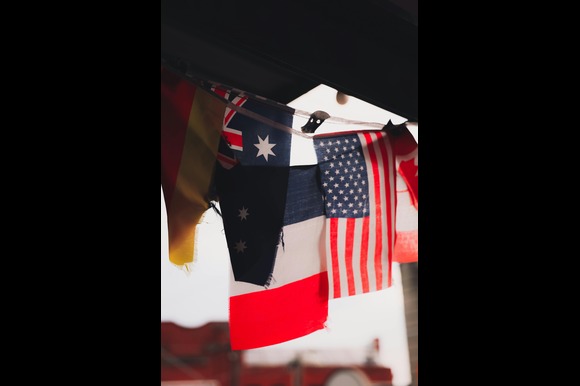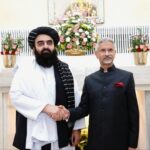From the White House on Monday, US President Donald Trump spoke warmly about his country’s enduring bond with Australia.
“We’ve been long-term, longtime allies, and I would say there’s never been anybody better,” he said, addressing Australian Prime Minister Anthony Albanese during their first official meeting. “We fought wars together, and we never had any doubts,” Trump added, underlining what he described as a friendship built on shared history and sacrifice.
Yet, for perhaps the first time in its modern history, Australia is beginning to question that relationship. The United States has long been viewed as Canberra’s closest friend and most trusted ally. But as global power dynamics shift and Washington adopts a more inward-looking stance, some in Australia are reassessing what that friendship truly means.
Before departing for Washington—a trip he had been eager to arrange for months—Albanese called the visit an important chance to “consolidate and strengthen” the alliance. “Australia and the United States have stood shoulder-to-shoulder in every major conflict for over a century,” he said.
But beneath the public assurances, concern has grown about how reliable America remains under the current administration. “The Trump administration is clearly fraying some of those long-held, unexamined beliefs about the reliability of the United States as an ally,” said Sam Roggeveen from Australia’s Lowy Institute in an interview with the BBC.
Trump’s first term strained Australia’s confidence, and few expected his second to be any different. During this year’s election campaign, debate frequently centered on how each prime ministerial candidate would handle relations with Trump. Frustration deepened when Washington imposed sweeping tariffs—10% on most Australian imports and as high as 50% on aluminium and steel—moves widely seen as breaching a decades-old free trade pact.
“This is not the act of a friend,” Albanese remarked at the time.
Tensions were further tested when the White House ordered a review of the landmark Aukus defence pact, announced in June, which caused alarm in Canberra. Publicly, Albanese’s government expressed confidence that the deal—granting Australia access to cutting-edge nuclear submarine technology in exchange for supporting US strategy to counter China in the Asia-Pacific—would proceed. Privately, however, there was concern that Washington’s isolationist rhetoric, coupled with its own submarine shortages, could jeopardize the agreement.
Adding to the unease was Albanese’s prolonged struggle to secure a meeting with Trump, interpreted by some in Australia’s media and parliament as a diplomatic snub. An earlier awkward exchange between Defence Minister Richard Marles and his US counterpart Pete Hegseth did little to help. In August, Marles met Hegseth to press the case for Aukus, but the latter’s office initially denied the meeting ever took place, describing it as a mere “happenstance encounter,” before retracting the statement.
In the end, Monday’s meeting turned out to be as successful as Albanese could have hoped. He left Washington with both Trump’s personal praise and a new deal promising US investment in Australia’s critical minerals sector—seen as key to breaking China’s dominance in that market. Trump also reaffirmed his commitment to Aukus, effectively putting to rest concerns about the review.
Albanese managed to avoid a public scolding, though there was an uncomfortable moment when Trump told Australia’s ambassador, former prime minister Kevin Rudd—who had been critical of him in the past—“I don’t like you either.”
Despite lingering frustrations over tariffs, which remain at their lowest rate for any US partner, certain Australian industries, such as beef, have benefited from global disruptions. The Aukus scare, too, proved to be a false alarm.
Still, Trump’s unpredictable approach to foreign policy and his treatment of other allies have contributed to growing distrust among Australians. “For the first time in my lifetime, one of our two major political parties benefited in the last election from slightly distancing itself from the US,” said Roggeveen.
Polls consistently show Trump is unpopular in Australia, and confidence in America as a dependable ally has waned under his leadership. Yet, paradoxically, about half of Australians still believe their nation needs the US alliance now more than ever.
“It’s one thing to say Donald Trump is difficult or unpopular,” noted Jared Mondschein of the United States Studies Centre. “It’s another to actually propose an alternative to the US right now. That’s really due to Xi Jinping. In many ways, he’s the gift that keeps on giving for the US in Asia.”
Tensions in the region remain high. Just before Monday’s summit, a confrontation between Chinese and Australian military jets underscored Beijing’s growing assertiveness. China, Australia’s largest trading partner, has dramatically expanded its military power—leaving Canberra and its regional neighbors increasingly anxious.
Many in Australia’s security community believe the country could not defend itself without US support, though a minority, including Roggeveen, disagree. Some analysts see Pacific nations as Australia’s first line of defense, while a smaller group argues that China could one day be a security partner rather than a threat.
“But the prevailing belief,” said Roggeveen, “is that the only reasonable path for Australia is to keep moving closer to the United States.”
Mondschein agrees. “A lot of allies and partners across the region are choosing the uncertainty of a term-limited Trump administration over the certainty of a Xi Jinping-led China,” he said.
So while Australian attitudes toward the US are evolving, few expect Canberra to deviate meaningfully from its long-standing path of alignment with Washington anytime soon.






